| HANGING AND DISPLAYING ART |
 |
| Once there was a hard and fast rule: art is to be hung at eye level and all art at the same height in a room, space frames two to four inches apart, don' t hang anything closer than 8" to the top of the couch, table, or mantle. The only exception was classical art in museums, where pieces were hung sky high up the wall.
Today, though, there is no limit to how to hang your art. And to compensate for all these unique displays, companies and creative homeowners have established art hanging systems and hardware-free display ideas that run the gamut from heavy duty metal bars across the walls to decorative adhesives that can be peeled off with ease.
Whatever your space restrictions or size requirements, there is an artwork hanging system out there that precisely suits your needs. Read on to learn about some of the popular options on the market, and how to install some less common hanging systems.
|
| IN THE HOME
|
 |
Classic hook and wire, or cables strung from the ceiling - there are plenty of hardware options available for everything from a tiny portrait in an ornate frame, to a large, vertical graphic design.
Sawtooth Hooks
Ideal for a small artwork in a lightweight frame, or an unframed canvas up to 12x18", sawtooth hooks are hammered or nailed into the top center of the frame and simply sit on a nail or screw in the wall. They stick out no more than 1/8" from the frame, so the artwork will hang perfectly parallel to the wall (the bumpers placed on the bottom to protect from scuffs make the bottom even with the top).
Order Online: Sawtooth Hooks
Picture Framing Wire
For larger and heavier framed fine art prints or gallery wrapped canvas, "D" hooks or hoops are drilled into either side of the frame, about one third of the entire height from the top. Heavy duty wire, often wrapped in a plastic coating for safety and added strength, is stretched between the hooks. A small amount of slack is allowed so the piece will hang properly.
This hanging system works well for heavier pieces because the weight is being supported by the vertical beams of the frame instead of the top horizontal beam. Depending on the size and weight of the artwork, multiple hangers may need to be placed in the wall, to ensure the piece remains straight and to prevent too much weight at a single point on the wire. Different wall hangers are approved for various maximum weights, from 25 pounds to more than 100.
The hooks used with framing wire can also be used on their own, on the two vertical beams of the frame, or one in the middle. The hook will then simply be hung over a nail or screw in the wall.
Order Online: Hanging Wire
Standoff Bolts
Used for mounted, unframed artwork such as photos that have been dry mounted or affixed to a plexiglass face mount, these metal bolts are inserted through holes in the top two (or all four) corners of the piece, and then screwed into the wall. Your art extends from the wall approximately an inch, and receives a modern touch from the smooth stainless steel circles visible in the corners of the image.
Plastic Tabs
For very light artworks such as small, unframed foam board or plastic dry mounts, these adhesive tabs are affixed to each side near the top. A hole in the non-adhesive end can be hung using a screw or nail. While the adhesive is very strong, this type of hanger is not recommended for important artworks.
French Cleats
Available in metal or wood, french cleat hangers are made up of two identical bars that each taper on one side, and stretch nearly the full length of the frame. One bar is drilled into the wall with the tapered end up, the other into the back of the frame with the tapered end down. When the frame is set onto the wall, the cleat holds the art straight with no chance of shifting. This hanging system is ideal for long, horizontal pieces or heavy pieces.
The downside to this system is the number of holes that must be drilled in the wall. The cleat needs to be secured at multiple intervals along its length. Likewise, the frame cleat will be affixed in numerous spots across the top of the frame. Because the horizontal frame length is holding the weight, the frame must be put together very strongly.
Order Online: Metal French Cleats
Bell Pull Hangers
Bell hangers are most commonly seen displaying finished needlework art. They are made up of two separate clamps that may be wood or thick wire, unadorned or ornate and usually the same length or slightly longer than the width of the art. One clamp holds the top edge, while the other clamps to the bottom. A hoop or hook in the top section facilitates hanging, while the bottom piece acts as a weight to keep the artwork hanging straight down and prevent curl in the edges.
Bell pull hangers can be used for unframed prints or even paintings if the original has been treated with a protective coating. They provide a clean, old fashioned style and do not require extensive wall hangers because they are generally lightweight.
Easel Stand
For a desktop alternative to artwork display, a long metal or wooden tab can be affixed to the bottom of the frame that allows the artwork to be displayed on a flat surface at a slightly reclined angle. This hardware is perfect for small plaque mounts, wood panel mounts, or face mounts.
Order Online: EaselMate Stand
|
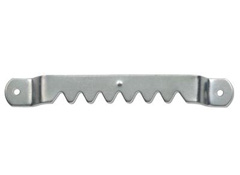
Sawtooth hook
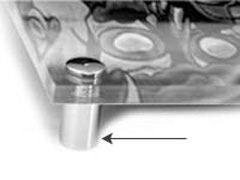
Standoff bolt on a plexi face mount
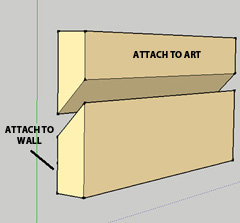
How french cleats are used
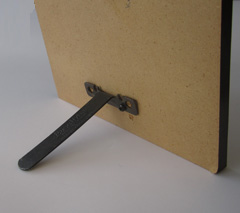
An easel stand on a plaque mount
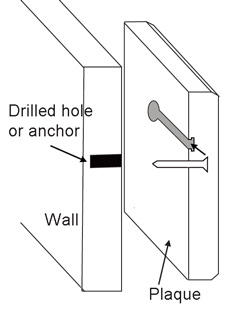
How To Plaque Mounts
|
| PROFESSIONAL HANGING SYSTEMS
|
 |
In recent years, many manufacturers have designed hanging systems for a wide range of commercial display requirements. While any of these systems could be incorporated into a private home, they are usually intended for displaying a large number of pieces.
Grid Panel Display
These art "walls" can be covered with any type of material to conceal the steel skeleton. Essentially a self standing vertical panel, hooks and hangers can be attached to the grid frame to allow single or multiple artworks to be hung at various levels. Intended for art shows and other temporary events, this system is designed to be quickly erected and easily stored.
Cables
Though originally used in commercial galleries or office spaces, cable hanging systems are becoming increasingly popular in the private realm. In most designs, a metal bar is affixed to the top of the wall, directly against the ceiling. Thin cables or wires are then hung vertically, and attached to the picture frame at customizable heights and distances. More than one frame can be hung in a vertical line, as well.
This hanging system is only practical for hanging multiple frames. Very thin cables can be nearly invisible on certain walls, but visible wires can lend a modern, industrial feel to the display. The cables can affix to either side of the frame, or come directly down the center for a single strand per frame. Some styles offer bars above and below the artwork with cables running up the entire wall for added stability. These versions can even be used away from the wall, with the bars adhering to the floor and ceiling.
Anti-Theft Hardware
There are many secure hanging systems on the market today. In addition to gallery spaces, they are used in office complexes, hotels, and condominiums, and prevent passersby from simply lifting the art from the wall. In most cases, the hangers are affixed to the sides of the frame, and once set on the wall, a key or tab is used to rotate the holes so the wall screws are clamped within the hook and cannot be disengaged without turning the key again.
|
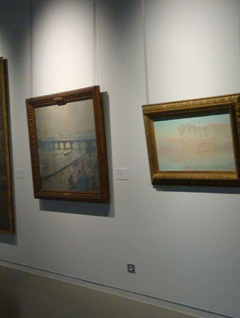
A cable hanging system in a gallery
|
| HARDWARE-FREE DISPLAYS
|
 |
With the advent of more freedom in the "right" way to display art comes new and stylish display ideas that require no hardware on the frame at all. Perfect for anyone with an eclectic or contemporary decor style, these options give new meaning to the phrase "hanging art."
Narrow shelves
Available from most home decor stores, these shelves are little more than lips that protrude a few inches from the wall. They range from a two or three feet long, to the length of the entire room, and a narrow groove along the shelf keeps your framed images secure as they lean against the wall.
Though the shelves themselves must be screwed into the wall, no other holes are necessary to hang your images, and rearranging is simple, without the need for filling old holes and making new ones.
Wall Sticker "Frames"
Wall decals have become quite popular, and with them the stick-on picture frame. Strips of patterened tape, or photographs of ornate frames printed on adhesive fabric or vinyl can be placed around your images and simply pressed to the wall. While most of these materials peel off the wall without removing paint, it is important to test them before using them on important prints or photos.
You can make stick on frames using your own images and our top quality removable adhesive. Simply order a fine art print and select Peel n' Stick Photo Tex as your paper.
On the Floor
More and more, large framed images - or even large gallery wrapped canvases - are seen sitting on the floor, leaning against the wall. This method eliminates the need for heavy duty hanging hardware and any damage to the paint. For a bit more height, the frame can rest on a stack of books.
Easels
Not just for creating art, easels are a popular choice for displaying it as well. Again, this method requires no hardware or holes, unless you choose to attach the artwork to the easel for added stability.
Simply set up the easel in an empty corner, and give your art an instant home. For rooms with less space, lean the easel against the wall before placing the artwork. A natural wood easel creates a rustic, traditional appeal, while a matte black or white stand will give the room a pop of modernism.
Order Online: Easels
|
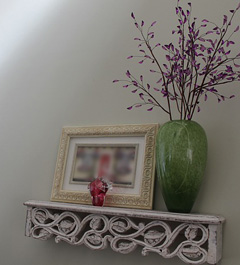
An ornate picture frame shelf
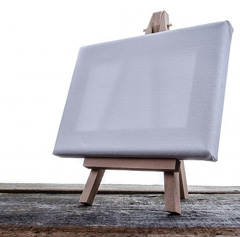
An easel display
|
| HANGING ART ON TRICKY WALLS
|
 |
|
Drywall with studs every few feet is the dream scenario for decorators. But when you're faced with brick, concrete or cinder block walls, art tends to be relegated to stacks in the corners. The hardware-free options above will work in these situations, but art hung in the traditional style is possible as well.
Picture hanging clips are available specifically for brick walls. They attach around a single brick, with metal teeth that bite in just above and below. As long as the brick protrudes slightly from the mortar, this is an excellent option that does not require any holes. Most brick clips are guaranteed to 25 pounds, but you'll likely want to set a lower limit to be safe.
Lead expansion anchors are another option. Just like anchors used in drywall, this hardware is pressed into a drilled hole (go slowly!) and a screw is threaded into the anchor. A masonry bit is used to drill in this case, and if the piece is heavy, the hole should be drilled into the brick itself instead, not the mortar. Leave the screw sticking out a few millimeters, and anything can be hung with picture wire.
In cinder block or concrete walls, it's easy to drill incorrectly and end up with a crumbling hole or one that will crack in time. A special hammer drill is required, as well as a masonry bit and either concrete screws or expansion anchors.
Holes in walls like this are much more difficult to fill later on, so it is a good idea to make sure you know exactly where you want your art before undertaking any of these permanent hanging procedures.
|
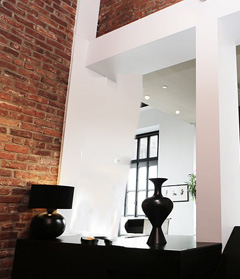
|
| INSTALLING HANGING SYSTEMS
|
 |
|
While drilling a hole and inserting an anchor and a screw is pretty straightforward, display systems for multiple artworks can be a bit more involved.
Cable systems - by far the most common - are put in place by first installing the track. A commercial strength metal bar with a sturdy lip is screwed into the topmost section of the wall, or the ceiling (in the case of brick walls and other problematic materials). The tracks are designed to hold various amounts of weight depending on individual requirements. Because the lip runs along the length of the track, any art suspended from the track can be easily moved back and forth for readjusting layouts. Some designs have a track at the bottom as well (called a "tensioned" design).
The vertical cables (metal rods are an alternative) can now be installed along the track. These cables serve to support the artwork, and also allow for vertical adjustment of the art to any point between the tracks. Attached to the end of the cable is a hook, which will again vary depending on the weight and security requirements. This hook sits in the recess made by the track lip, so it can slide back and forth but will not slip out.
One important determination for cabled systems is whether to use two cables - one at each end of the frame - or a single cable down the center. This choice depends on the width and weight of the frame, as well as human interaction with the art. For instance, if people are going to be brushing past the artwork, two cables will ensure the artwork is more secure. Additionally, in the case of hanging multiple pieces vertically, two cables is advisable even if the pieces are small.
The materials used in these systems mean they are traditionally intended for straight walls. New advances, however, have made track and cable systems possible for curved walls as well.
|
| Whatever your location, square footage, wall space, or decor preferences, there is an artwork installation and display style for you. Combine your traditional frames with some dry mounts and gallery wrapped canvas for an eclectic array of beautiful art. You can order all your different prints online - simply upload your images to get started!
For more information about various hanging hardware attached to the wall, read our Hooks for Hanging Wall Art article.
If you have any questions about our products or services, please don't hesitate to contact us. Our knowledgeable staff are always happy to offer advice and suggestions.
|
|
© 2002-2026 - KeenART Media Ltd.
|
|
| |
|

